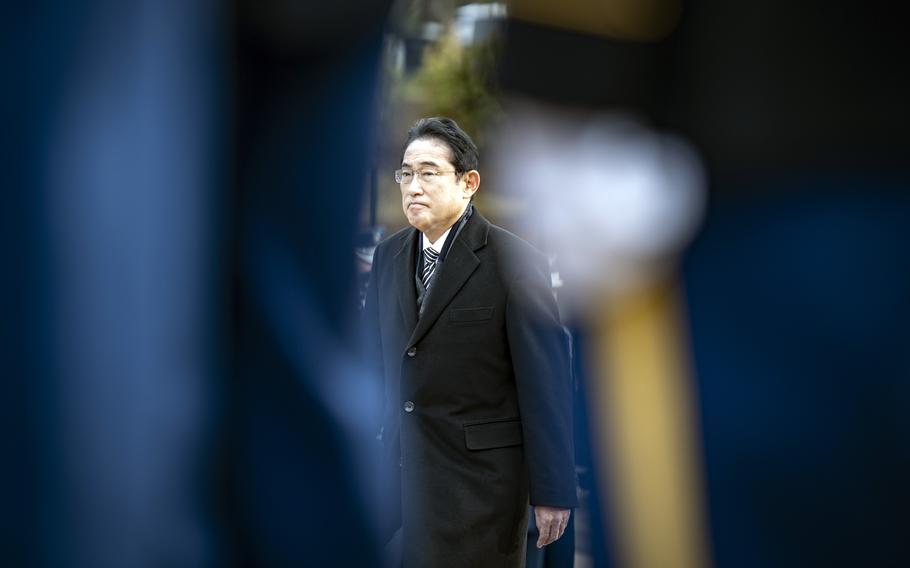
Japanese Prime Minister Fumio Kishida visits Arlington National Cemetery in Arlington, Va., Jan. 13, 2023. (Elizabeth Fraser/U.S. Army)
YOKOSUKA NAVAL BASE, Japan — A U.S. senator threatened to undermine a pending weapons deal with Japan unless it hands over a Navy officer serving time in a Japanese prison for two traffic deaths.
Sen. Mike Lee, R-Utah, in a series of tweets starting Tuesday on his personal Twitter account and aimed directly at Japanese Prime Minister Fumio Kishida, demanded that Kishida “remand Lt. Ridge Alkonis to the custody of the U.S. Navy.”
Less than an hour later, Lee revised his deadline to just 24 hours and invoked Japan’s plan to purchase 400 U.S.-made Tomahawk cruise missiles for $1.55 billion. The missile purchase is part of Japan’s largest-ever defense budget, $50 billion, designed to address China’s growing influence in the region.
“@kishida230, we might need to reconsider this,” Lee tweeted at the prime minister’s Twitter handle. “Hand him over. Now.”
Lee’s deadline passed with no response from the Japanese leader.
“@kishida230, you’ve made your choice,” Lee tweeted again. “I hope you’re ready for some conversations on the Senate floor that you’re not likely to enjoy. This issue isn’t going away, and neither am I.”
Lee sits on the Joint Economic Committee, the Judiciary Committee, the Energy and Natural Resources Committee and the Special Committee on Aging. He was removed Feb. 1 by minority leader Sen. Mitch McConnell from the Senate Commerce Committee, the most significant of his assignments in apparent retribution for supporting Sen. Rick Scott of Florida as Republican leader over McConnell, the Salt Lake Tribune reported Feb. 3.
Alkonis, of Claremont, Calif., is eight months into a three-year sentence for negligent driving that caused the deaths of two Japanese people and injured a third in May 2021. Shizuoka District Court sentenced him in October 2021.
Lee on Twitter first threatened a critical review of the routine operating agreement between the U.S. and Japan if Alkonis wasn’t returned to the Navy by the deadline.
“If you do so, I’m willing to forget all about this unfortunate incident,” he tweeted at Kishida. “If not, we’re going to have a long series of conversations about the SOFA that you will not enjoy.”
SOFA, the status of forces agreement, specifies the rights and responsibilities of those affiliated with the U.S. military in Japan.
Lee later threatened to derail the Tomahawk purchase but didn’t specify how he might delay or stop the sale.
The senator then promised to “inform Americans of how poorly you’re treating military personnel — not just Ridge Alkonis, but all 55,000 U.S. forces in Japan,” in another tweet to Kishida.
The Prime Minister’s Office of Japan said it would not comment, a spokeswoman told Stars and Stripes by phone Wednesday. A Ministry of Foreign Affairs official also declined to comment but said by email: “We believe it is a case that needs to be handled appropriately based on law.”
It’s customary in Japan for some government officials to speak to reporters on condition of anonymity.
The U.S. Embassy in Japan referred all questions to Lee’s offices, which did not return multiple calls requesting comment. U.S. Forces Japan acknowledged but did not immediately respond to a request for comment Wednesday.
Formerly a weapons officer assigned to the destroyer USS Benfold, Alkonis was driving with his family through Fujinomiya after a trip to nearby Mount Fuji when he fell unconscious and crashed into the victims outside a soba restaurant.
The officer’s defense hinged on the claim that he suffered from altitude sickness after visiting Mount Fuji’s fifth station, but the argument failed to convince the court.
The Tokyo High Court upheld the conviction and sentence on appeal.
The case sparked a movement to secure the officer’s release, spearheaded by his wife, Brittany Alkonis, who has demonstrated across the country, met with Vice President Kamala Harris in Washington, D.C., to plead her case and met President Joe Biden after his State of the Union address in Congress on Feb. 7.
Lee, on Tuesday, said the U.S.-Japan alliance is good for both countries but is “especially good for Japan.” He then pointed to the lack of health care availability for Defense Department civilians in Japan as an example of the need to review SOFA.
“This is yet another reason why our Status of Forces Agreement with Japan is woefully inadequate to protect U.S. military personnel in Japan,” he tweeted.
Stars and Stripes reporter Hana Kusumoto contributed to this report.